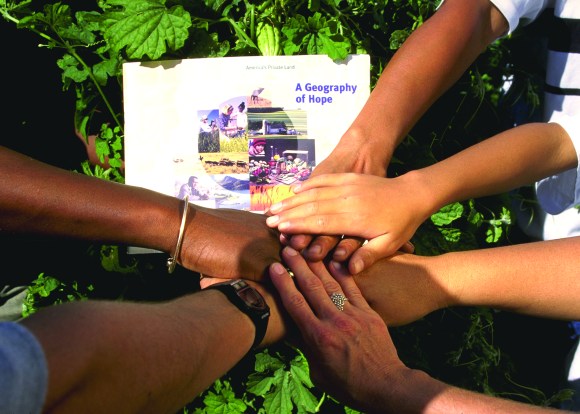
Wikipedia is based on the belief that every person, everywhere should be able to freely share in the sum of all knowledge. This vision only works when when every single person feels welcome to participate and collaborate openly, regardless of background or identity. At the Wikimedia Foundation, we believe this commitment to inclusion applies to our staff as it does to Wikimedia communities. Today, I’m proud to share that we’re affirming this commitment by making some important updates to our non-discrimination policy.
Our updates go beyond protecting all the classes that the law requires. Our updated non-discrimination policy includes new explicit protections and expanded definitions related to gender identity and expression, disability, citizenship, and ancestry. This updated policy codifies practices and values already in place at the Foundation, and builds on recent efforts to support inclusivity and equitable opportunity within our organization, including expanding our parental leave policies, standing in support of our global staff, and appointing Talent & Culture leaders with strong track-records in supporting people rather than process.
Our previous non-discrimination policy had not been updated since 2006. While it was progressive at the time, we know time keeps moving forward. As you might imagine, in nearly eleven years, not only has the law of equal opportunity changed, but our understanding of how to best manifest equitable opportunity has evolved as well. We believe that this recent update better reflects our commitment to non-discrimination—and to realizing the diversity of talent, identity, and experience necessary to support one of the world’s most beloved and popular websites.
The first additions regard gender identity and gender expression. Our updates here reflect the Foundation’s belief that regardless of how someone identifies or expresses their gender, they bring value and perspective to our work. With this and all the updates, the Foundation affirms its belief that a diversity of backgrounds and perspectives is critical to effectively serving the Wikimedia movement worldwide.
The new policy includes explicit protection in a number of other areas, including veteran, military, marital, and childbearing status. We also added an expanded definition of protected disability to explicitly include mental as well as physical disability. The Wikimedia movement and the Wikimedia Foundation welcomes contributors of all of these statuses and backgrounds.
Finally, the policy adds explicit protections for citizenship and ancestry, confirming the Foundation’s belief that each person should be considered as an individual, regardless of the nation or culture from which they hail. The Foundation seeks to find the most passionate, dedicated, and talented employees who are committed to its mission to help make the world’s knowledge freely available to all, and celebrates the rich tapestry of language, culture, and identity that inform these efforts.
In addition to the updates to this important policy, our Talent & Culture department is supporting new employee resource groups, as well as an organization-wide discussion group on diversity and inclusion. Some of the employee resource groups being developed include ones for parents, LGBTQ+, immigrants, and women.
These groups have already been involved with the updates to our non-discrimination policy and other recent efforts. They are also looking at actions for the future, such as bringing in outside speakers to discuss topics like the gender gap, the transgender gap, and anti-harassment efforts; coordinating our efforts at events like San Francisco Pride and diversity work fairs; and reviewing our recruitment materials to better reflect our diverse workplace.
The Wikimedia Foundation will continue to develop our internal programs and policies to help nurture an inclusive and equal opportunity workplace that allows us to recruit the best talent possible to serve the Wikimedia movement.
Katherine Maher, Executive Director
Wikimedia Foundation
Special thanks to Angel Lewis, Joady Lohr, Patrick Earley, Jacob Rogers, Michelle Paulson, Gregory Varnum, and Juliet Barbara for their contributions to this update.

Can you help us translate this article?
In order for this article to reach as many people as possible we would like your help. Can you translate this article to get the message out?
Start translation